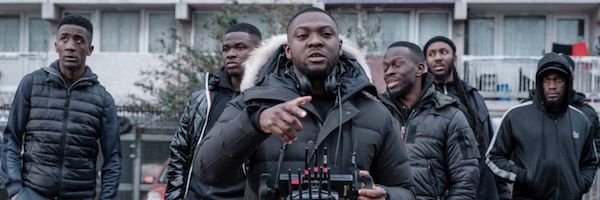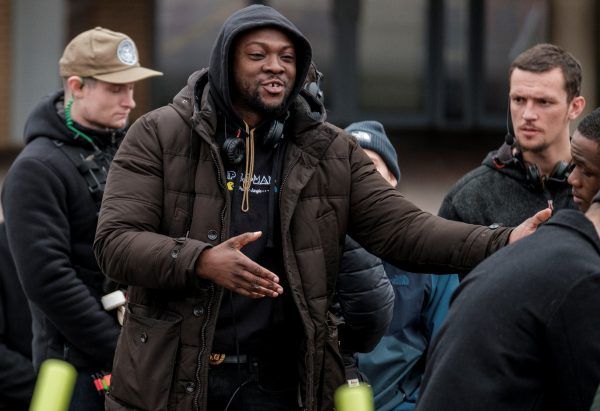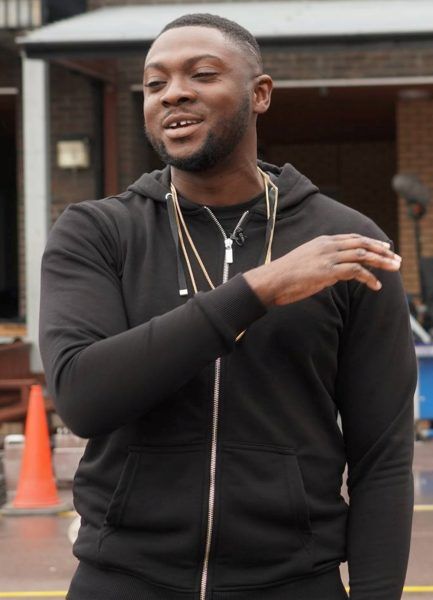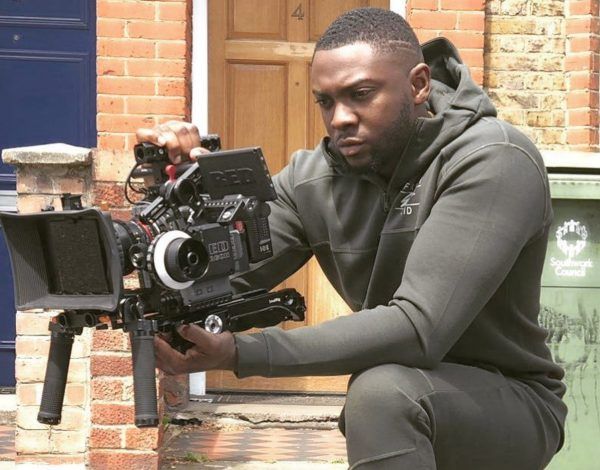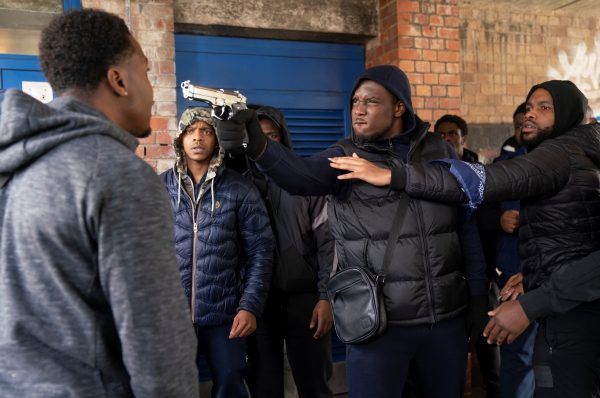From writer/director Rapman, an exciting new visionary voice in cinema, the urban crime drama Blue Story follows best friends Timmy (Stephen Odubola) and Marco (Michael Ward) from opposing London boroughs. When an act of violence divides the young men and places them on rival sides of a seemingly never-ending gang war that can have no happy ending.
During this 1-on-1 phone interview with Collider, the South-East London-bred Rapman (also known as Andrew Onwubolu) talked about the experience of writing a script that’s so personal for him, why he was scared to have anyone read it when he was done, being nervous about his friends and family seeing the finished film, what inspired him to be a filmmaker, how the first day on set compared to the last day, and what he learned from the shoot that he’ll carry with him to his next film. He also talked about his approach to American Son, his remake of the French film A Prophet, how he’d like to see someone do an adaptation of Blue Story, and what he believes is the key to his success.
Collider: I was truly impressed with your work on this. You have such an interesting voice as a filmmaker, and I’m excited to see what’s next from you.
RAPMAN: Thank you very much. I’m glad you enjoyed it.
You’ve previously talked about how this was the first script that you wrote, but not the first thing that you made. Are you glad that you waited and had the experience of making Shiro’s Story first? Do you feel like Blue Story really benefited from the knowledge that you had, going into the shoot?
RAPMAN: Yeah, definitely. When I think about it, if I would have made Blue Story when I wrote it, I wouldn’t have been able to do the script justice. I wrote Blue Story in 2016 and shot it in 2019, and in that time, I’d done so much. Shiro’s Story was the thing I did justice for, and I put a lot of work into that, so I was ready. I knew, after that, I could go on to do a feature, or anything, because I’d been through everything while doing that trilogy. Over the years, I’ve done so many different types of shorts, but on that trilogy, I knew that I was ready. That definitely helped me to go straight into Blue Story.
How was the experience of writing a script for a story that’s so close and so personal for you and then shooting that? Does it give it more weight for you?
RAPMAN: I wouldn’t say that it gave it more weight. When I wrote it, no one really knew who I was. There was no pressure from a studio or a big movie star saying, “When can I read the next 20 pages?” I was literally doing it as a hobby. I would wake up every day, work out, watch my buddy, and then write five pages, or add some pages to it. Every day I would add to it until it was finished, but it took me months ‘cause I write really slow. I didn’t have any pressure or urgency to finish it ‘cause I didn’t think it would ever get made, so I just wrote it. I knew that, one day, it would make a good movie, if it ever got made, but I didn’t think it would get made anytime soon, and if it did get made, I figured it would be something I would have to fund myself. So I wrote it with so little pressure. It was just something that kept me busy. It was already on YouTube, so it was literally just filling in the blanks and making it over. It was good for me to do something that made me relive some good and bad times of my childhood.
When you finished writing the script, was there anyone that you gave it to, to read it for feedback?
RAPMAN: It took me so long that I was so scared of someone telling me, “This is bad, this is terrible,” that I didn’t let anybody read it for two years. The person I let read it first was someone who was just a friend, and he loved it. I was like, “Okay, it might not be for the film world, but I know that my friend likes it.” And then, I let another friend read it, and he loved it. The scariest thing was when I sent it to the producer, Damian Jones. He said, “Send it to me,” and he’s made loads of movies. So, he read it and said that he liked it, and I said, “Okay, maybe it’s not too bad.” I loved it, but I’m not someone who thinks, “If I think it’s great, then it must be great.” If I think something is great, that could still mean that everyone else thinks it’s terrible. I wasn’t sure if I wrote it right or if I was meant to do a script, but people seemed to like it ‘cause we had offers from it, five days after we sent it out. I was happy about that because I was really scared.
Similarly, once you finished shooting the film and cut it together, did you screen it for anybody? Were there any family or friends that you showed it to?
RAPMAN: Again, I was so nervous for my family and friends to see it, but I thought it was the best. We did a test screening, that was the first screening outside of the studio and the producers, and I hung out in the projection room so that no one would recognize me. I could see people, but I couldn’t hear nothing from where I was. My manager, who’s a filmmaker as well, watched it and he texted me saying, “That’s a classic.” If he thinks something is terrible, he’d tell me, so when he said that to me, I knew it was good. He said, “They loved it. They loved every word of it. They laughed, they cried, and everything.” So, I knew that it was good. And then, when my family saw it, they agreed. It felt like a big weight off my shoulders, that other people saw what my vision was. They liked the script, and that it translated in a way that was visually entertaining as well. When they realized that it ticked all of those boxes, they knew it was a win for them. However the critics reviewed it didn’t matter to me, because I was proud of myself and proud of the film.
What was it that made you want to be a filmmaker and actually led you on this path? It’s one thing to want to be a filmmaker and to write a script, but actually getting a movie made is a big deal, so what inspired you?
RAPMAN: I grew up watching old movies and old stories, from biblical stories, to stories about the Romans, to West Side Story, to Romeo and Juliet and Shakespeare, to Grease, to Boyz n the Hood and Menace II Society. And then, when I started listening to hip-hop, and Tupac, Biggie, Nas and Jay-Z, they would always rap stories, but I would never see the videos for the story songs that I was into, so I always wondered what the visuals would be like. When I started rapping, I wanted to tell my own stories, so I created my own visuals that were like little films. You weren’t just listening to a song, you were watching a short film. So I did that for awhile, and then I said, “Okay, I need to write a movie.” By the time it was ready to get made, I had the experience to do it because I’d done so many of these shorts. Since I never thought the movie would get made, when I found out that we had offers, I couldn’t believe it. I met that producer in October, and by the following November, the movie was out in theaters. Everyone says that time frame is unheard of, meeting a producer and then, all of a sudden, the film is out a year later. I’m so blessed. I just knew that was meant to be. I call myself a storyteller, so anytime it comes to telling a story, I know that’s what I was meant to do. I just always wanted to do it on the biggest screen possible, which is the silver screen, which is a theater screen. I didn’t know if it was ever gonna come true, but I knew that was where I wanted to be, and now I’m living that dream.
What was it like to walk onto the set the first day and lead this production, and how did that compare to what the last day felt like?
RAPMAN: I was super excited on the first day, ‘cause not only was it my first day on the film, but my son plays the young Timmy in the beginning of the film that’s speaking to his mom. My son was on set for the first day, as well, so that was mad. I was just super excited and ready to go. And then, the last day, I was super tired and freezing. The last day, we were shooting at four in the morning and it was minus 15, or something. It was the coldest day ever, and my fingers and feet were numb. I remember being super tired and super cold, and then we finally got what we needed and it was a wrap, and I realized that it was done. I always figured there would be reshoots, so I didn’t think it was really over, but it was really done. We never actually did any reshoots, really. From that experience, I knew that I was meant to be on set directing movies. It was tiring ‘cause we only had 23 days to make the movie, which was nowhere near enough, but we got it done. It was such an adrenaline rush. I didn’t realize how much weight I put on. You actually blow up when you’re making a movie. When I look back at all of the photos, I saw that I blew up from eating everything. In the morning, I’d eat breakfast ‘cause I wanted energy, and then I’d get a snack, and then I’d eat lunch, and then I’d get dinner, and you’re snacking for energy. I wasn’t sitting in video village. I was on my feet, watching it with the actors and standing there with them. So I was eating for energy and putting on so much weight. I wasn’t exercising ‘cause I was waking up at six in the morning to go on set, so I didn’t realize how fat I was. Now, I’m gonna be very careful when I make my next movie.
It was announced that you’re doing American Son, which is an adaptation of the French film A Prophet. What is your approach for the adaptation of that?
RAPMAN: I can’t really say too much about that, but it’s very, very different. You will relate to it very differently. I’m making it very modern. I’m making the story just as powerful, but we’re talking about different ethnic races. It’s going well so far. We’ve been casting and location scouting, and done all of that. We’re nearly there with it and we’re about to hopefully close a deal with our lead actor. If we get who we’re trying to get, it’s gonna be really special. I see why everybody loves A Prophet, and I think they’re gonna love American Son just as much. The journey that we’re gonna go down, even though it is really similar to A Prophet, it’s also very unique and very standalone compared to the original. That’s all I can really say. I can’t wait to start filming it.
When you take on an adaptation, as opposed to doing your own work, is there a different level of nervousness to that?
RAPMAN: This is the first script I’ve ever directed that I didn’t write. I was nervous in the beginning because everybody loves the original, but Dennis Lehane wrote the script and we’ve had a lot of conversations and I’ve helped rewrite quite a few bits of the story. It’s 100% his script, but there are scenes that I’ve added in and things that I’ve taken out to make it my own. As long as I know the story, I can relate to the story. I can do with it what I did with Blue Story, and make it my own.
Now that you’re working on an adaptation of someone else’s film, would you be curious to see what a filmmaker from another country might do if they adapted Blue Story and told their version of that story, set wherever they’re from?
RAPMAN: I would actually love that. I wouldn’t be mad, at all. I would love to see someone in America or France or Germany or Asia do it. Hopefully, someone does that one day. I would be all for it. The funny thing is that type of story could be adapted anywhere. Everywhere in the world has gangs. We might be speaking about that, one day. Who knows?
What did you learn from making Blue Story that you now want to apply to future films that you do?
RAPMAN: I’ve realized that time is everything. I always knew that anyways, but now I’m really fighting for more days on American Son. I need as much days as possible. And now, I know how important it is to get your stuff before the sun goes down, and I know how to stretch everything to get the most out of the day. I’d never worked with a costume department before, so I’d never had to wait for a costume department to come in and change the color, or to add or remove make-up. I’m so used to just going again, not waiting for someone to get more make-up. So, going forward, I will be telling my costume department to only come in if it’s drastic. I don’t care if the color is off, I want the performance first ‘cause I’m not losing time again. From now on, I’m really gonna manage my costume department because you’d be surprised how much time that takes from you, when you’re trying to get a take while they’re applying make-up. I can’t wait to take things to the next level with what I’m gonna do with American Son.
As a filmmaker, you want to establish your voice, and this film really showcases that you have a definite voice and point of view, but then you also want to surprise people. Because of that, did you really put a lot of thinking into figuring out what you wanted to do after making Blue Story?
RAPMAN: Yeah, I really did. I got approached by Netflix, even before Blue Story was finished, and they told me that they really want to work with me on a show. I was working with Quibi at the time, and I was getting contacted from BBC to do dramas. I remember thinking to myself, “What do I do next?” I wanted to do another movie, but I didn’t have any other movies written, and I didn’t know if my film was gonna garner enough respect, where a producer was gonna give me someone else’s script. So when American Son came to me, I was like, “I don’t really wanna do it.” I wanted to do something no one had ever seen before. But after I watched A Prophet again and I read the script again, I said, “Can I make this my own?” And they said, “Yeah, you can make it your own.” I thought it would be a perfect follow up to what I’d done with Blue Story, and I felt like it was the best option to go ahead with after my movie. You’ll see the reason why, the way it comes out. I thought if I’d gone to do TV next, then I’d be labeled a television showrunner, instead of a film director, and I didn’t really wanna go that route just yet. I look at Ryan Coogler’s journey, with Fruitvale Station, which was his Blue Story, and then he went on to do Creed, and then he did Black Panther. For me, that trajectory is exactly the way I wanna go. He did a no budget, a small budget, and then a massive budget. That’s the trajectory that I wanna go on now. That’s more for me. If I do come back and do TV, then it’s gonna be my own TV show that I’ve written and directed after I’ve gotten a few movies under my belt.
What do you personally feel the key to your success is?
RAPMAN: Just never giving up. I really think that’s it. The difference between most people who make it and the people who don’t is never giving up. I was doing it for five years, non-stop. For 12 months of the year, I would release 10 shorts and try to build up my fan base. The first year, you’ve got everyone behind you saying, “Go for it.” The second year, you’ve got less people saying that. The third year, you’ve got people saying, “Maybe it’s time to get a job. This isn’t really worth it.” But I never stopped. I couldn’t. I didn’t know if I was ever gonna be successful, but I just wanted to do it for the small little following that I had, hoping that one day I could make something from it. The fact that I never gave up, I think, is the reason why these opportunities came to me going forward.
Blue Story is available on digital.

